Find out more about our 2021 student intake by scrolling down this page.
Sanni Ahonen (Aberdeen) 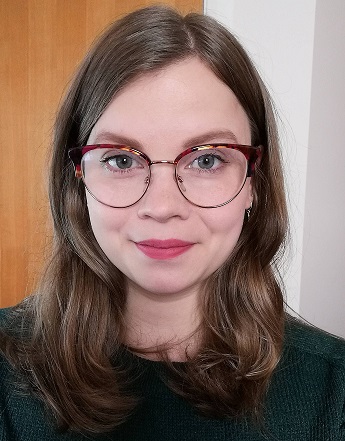 Project title: Neuronal integration across senses: Psychophysical and computational approaches to cue integration in injured brain
Project title: Neuronal integration across senses: Psychophysical and computational approaches to cue integration in injured brain
First supervisor: Arash Sahraie
Second supervisor: Thomas Otto
Third supervisor: Mary Joan McLeod
Personal note: Hello, my name is Sanni! I graduated in 2019 with a BSc in Psychology from the University of Aberdeen, and have now returned to the School of Psychology to undertake my PhD. My research project involves investigating multisensory integration in the context of conscious awareness in the injured brain. Specifically, I will use established psychophysics paradigms to map the parameters of audio-visual cue integration and reported conscious awareness, then develop computational models to investigate the underlying neuronal processes involved in cue integration and how this leads to the formation of conscious experience.
In my spare time I relax with knitting, crosswords, and spending time outdoors. I especially enjoy trail walking which is a great way to de-stress!
Awards: Alan B Milne memorial award for best UG Dissertation in Psychology (2019, University of Aberdeen)
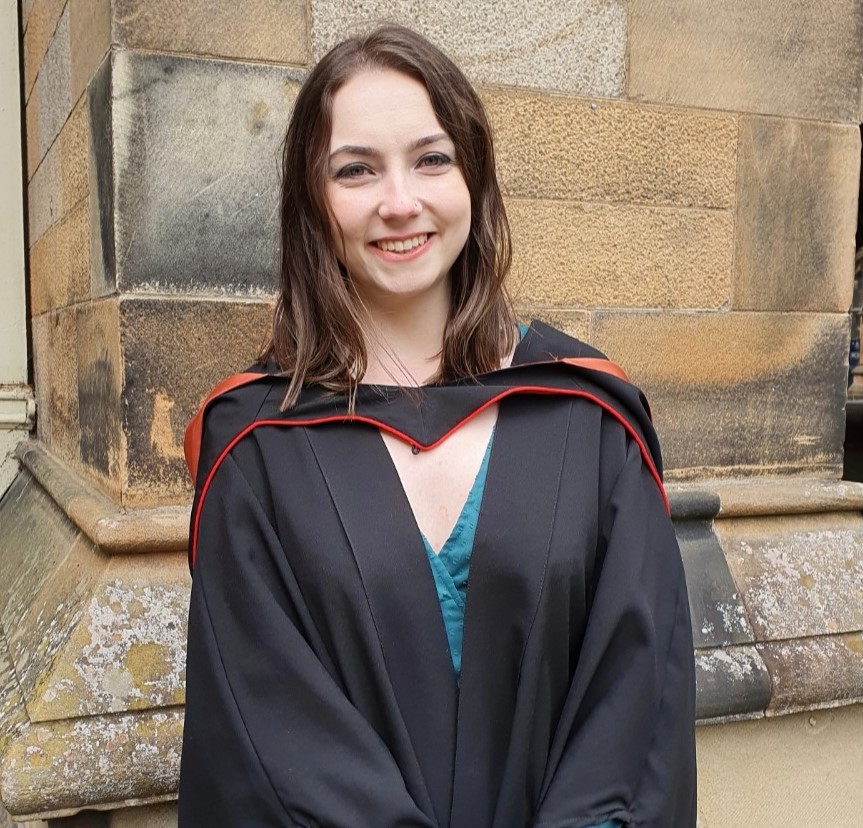 Emma Louise Armstrong (Edinburgh)
Emma Louise Armstrong (Edinburgh)
Project title: The chicken or the egg; unravelling immunological mechanisms of in ovo vaccination
Personal Note: Hi, I am Emma! I will be working with the Vervelde group at the Roslin Institute in Edinburgh to investigate the immunological mechanisms of in ovo vaccination. In ovo vaccination is a technique that is widely used within the poultry industry to vaccinate chicks during embryonic development (ED18). Despite having been used for over 30 years, there is still a lack of understanding how these vaccine induce an effective immune response within the neonatal chick and so, my project will work closely with MSD-Animal Health to begin to expand this understanding using both in vivo and in vitro models.
Before starting my PhD I completed an integrated MSci in Veterinary Biosciences at the University of Glasgow. My masters project utilised ELISA techniques to investigate factors which affect antibody responses to Feline Leukemia Virus, with a particular focus on vaccination.
Outside of the lab I enjoy weightlifting, hill-walking and a good coffee with friends!
Alex Arrese-Igor Royuela (Edinburgh)
Project title: Engineering lactate sensing/controlling systems in mammalian cells
Muhammad Assir (Aberdeen)
Project title: Investigation of the molecular mechanisms of intellectual disability using human-brain organoids
Edmund Astin (Dundee)
Project title: Structure-function analyses of aphid effector-target interactions
I graduated from the University of Edinburgh in the summer of 2020 with a BSc (Hons) in Biochemistry. My honours project focused on designing a purification protocol for and starting to characterise two chromatin-associated proteins from Trypanosoma brucei. For my PhD, I am working in Jorunn Bos’s lab at the James Hutton Institute in Dundee, and my project is co-supervised by Bill Hunter for the structural aspects. I am studying effector proteins present in the saliva of Myzus Persicae, the green peach aphid, investigating how they interact with their plant target proteins during aphid feeding. I aim to determine the structure of select effectors and explore how this relates to their function. Outside of the lab, my main hobby is music, particularly playing piano and singing with my choir.
Jack Barber (Edinburgh) Jack is also yourEDI rep!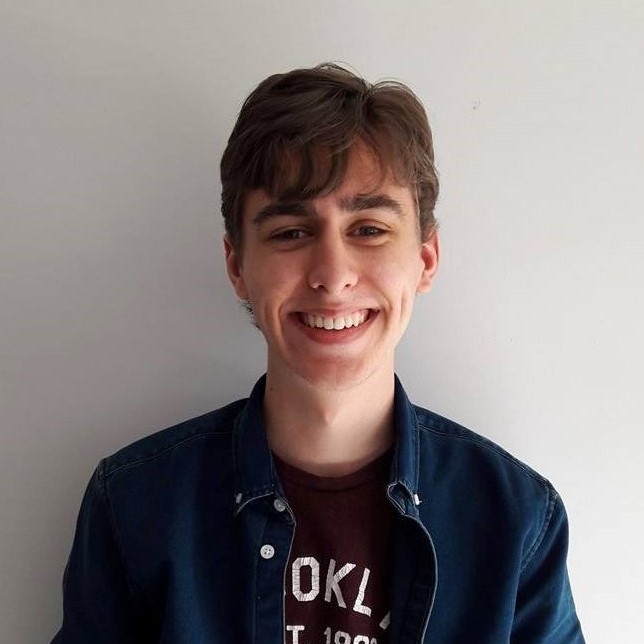 Project Title: Why doesn’t the evolution of antibiotic resistance have a larger fitness cost?
Project Title: Why doesn’t the evolution of antibiotic resistance have a larger fitness cost?
Supervisor’s Staff Research Page
Personal Note:
My PhD project is being supervised by Dr Tom Vogwill at the University of Aberdeen (co-supervisors: UoE's Prof Nick Colegrave and UoA's Prof Stuart Piertney). Together, we plan to utilise a range of techniques to investigate the fitness costs associated with antibiotic resistance, including laboratory microbiology, data synthesis and comparative genomics. The experimental evidence we aim to provide will reveal key missing pieces in our understanding of the evolutionary mechanisms underpinning antibiotic resistance, and the results could both improve the validity of laboratory experiments and inform clinical practice. I’m a Glasgow native, and in 2021 I graduated with an integrated master's degree in microbiology from the University of Glasgow. During my year-long master’s placement at HIPS in Saarbrücken, Germany, I worked with Dr Ronald Garcia to isolate and characterise soil myxobacteria with the aim of identifying novel antimicrobial agents - and I also discovered a novel family of soil bacteria in the phylum Bacteroidetes! When I'm not working hard in the lab, my favourite thing to do is spend the night in watching classic films from the 1930s-60s.
Inga Barnett (SRUC)
Project title: Optimising amino acid nutrition in periparturient dairy cows
Alice Buckner (Edinburgh)
Project title: Characterisation and optimisation of the rumen microbiome
Fiona Bunn (Edinburgh)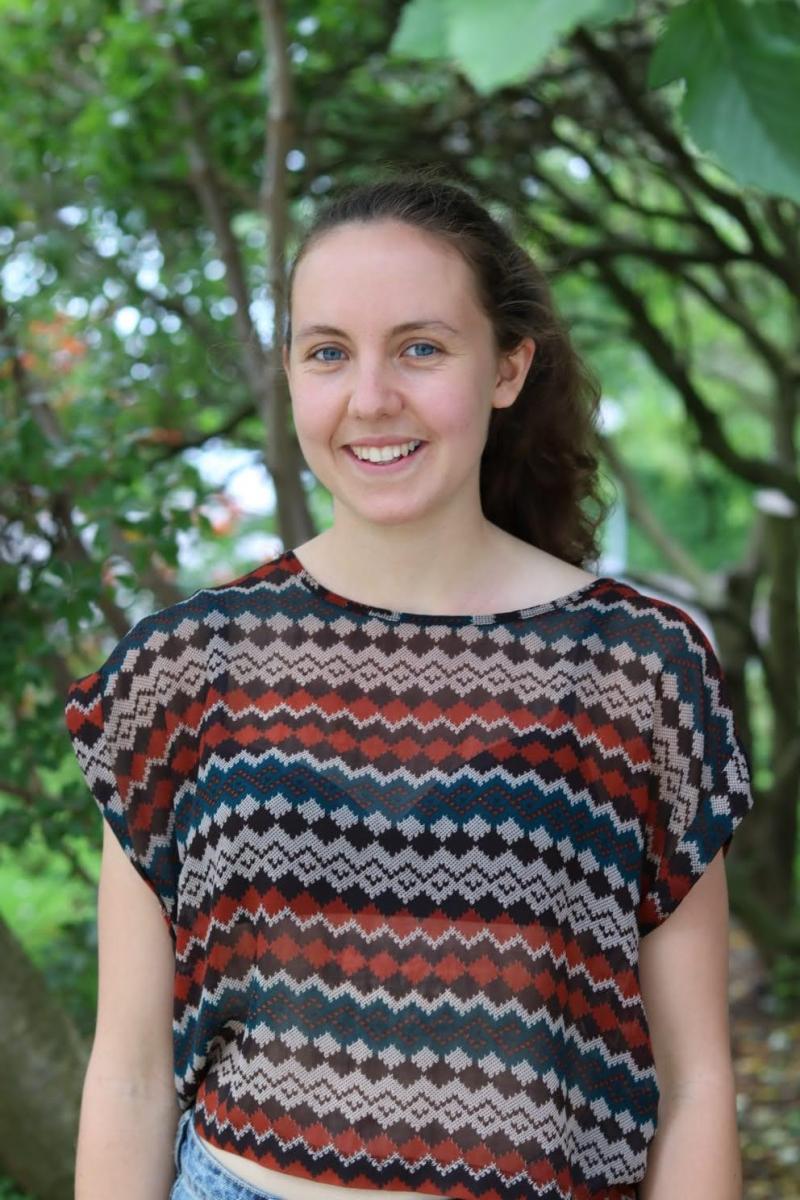 Project title: “Bioleaching of critical metals”
Project title: “Bioleaching of critical metals”
Supervisors webpage: https://horsfall.bio.ed.ac.uk/
Staff webpage: https://www.ed.ac.uk/profile/louise-horsfall
Personal note: I completed my undergraduate studies in Natural Sciences at The University of Cambridge, and an MSc at The University of Edinburgh in Synthetic Biology and Biotechnology where I was a part of the 2021 iGEM team. I am now excited to join the Horsfall group at the University of Edinburgh on an inter-disciplinary project to research biological methods for recovery of rare earth elements from electronic waste (and for biomining purposes). This topic will be crucial for sustainable development in the future as demand for these resources is projected to increase greatly over the coming years. I am on a CASE studentship with industrial partners SEM (https://sem.world/), hoping to bring my research to reality. Outside of the lab I enjoy running, cycling and exploring the mountains!
Ella Rose Catherall (Edinburgh) Ella is also your EDI rep!Project Title: Regulation of Rubisco in a Synthetic Pyrenoid-Like Condensate Expressed in Rice
Supervisor’s Staff Research Page
Personal note: Hi! My name is Ella (She/Her) and I will be studying for my PhD in the lab of Dr Alistair McCormick. In my project, I will be trying to express components of the pyrenoid, a really awesome CO2-concentrating mechanism found in a range of algae and hornworts, in rice. The thing I find most interesting in all of Science is chloroplasts, and so I’m really looking forward to getting to research them every day for the next four years! Prior to starting my PhD, I graduated from the University of Cambridge with a BA in Natural Sciences, specialising in Plant Science. As part of my degree, I carried out a computational research project looking at the chloroplasts of red algae in the lab of Prof. Howard Griffiths supervised by Dr Indu Santhanagopalan. I have also completed lab placements at the Wellcome Sanger Institute and the University of Oxford Department of Plant Sciences. Outside of Science, I’m a massive fan of musicals and I love going to the cinema.
Hannah (Poppy) Clark (Aberdeen)
Project title: The role of sponge competition in cold-water coral reefs – ROV video analyses and secondary metabolite profiling in the search for compounds of medical and ecological relevance
Phoebe Crawley (Dundee)
Project title: Investigating the epigenetic basis of preleukaemic stem and progenitor cells to promote healthy aging
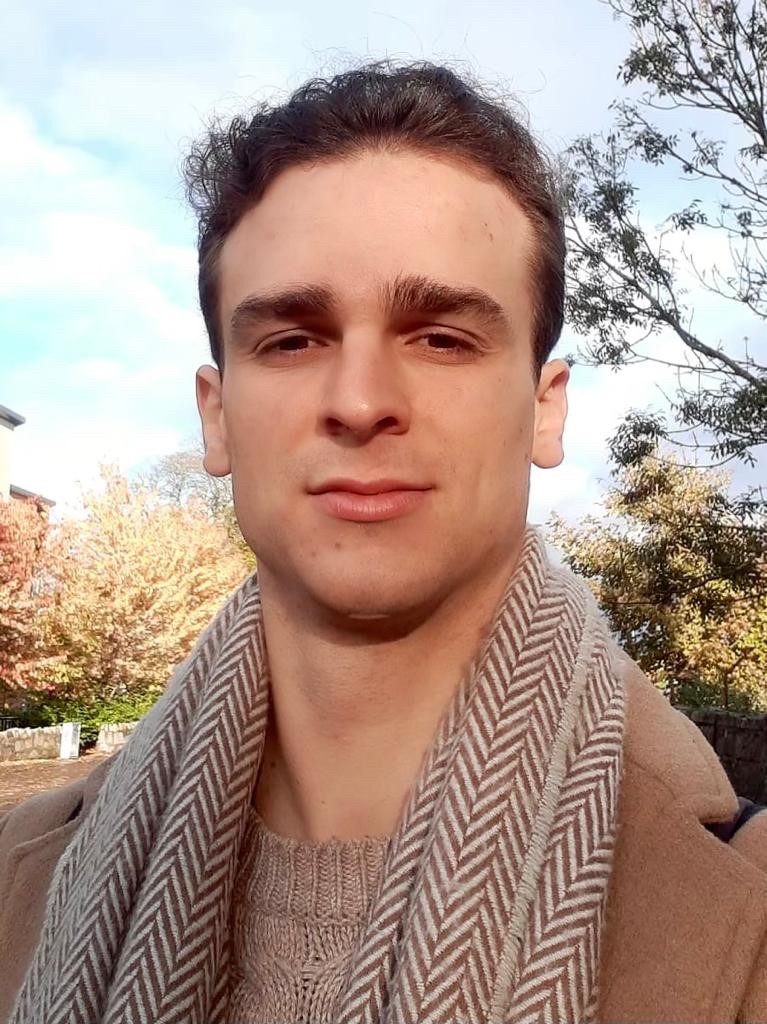 Lorenzo Croce (Aberdeen)
Lorenzo Croce (Aberdeen)
Project title: Rethinking the retinoic acid receptor: a revisionary view of the rapid pathways triggered.
Passionate about the science of the brain from DNA to cognition, with a particular interest in neurogenerative diseases and affective neurobiology. I am enthusiast scientific communicator, eager to constantly learn and expand in knowledge, skills and expertise: from molecules to public health and further beyond.
My project looks at pharmacological testing of synthetic retinoids (compounds akin to Vitamin A) as potential neuroregenerative therapies. The project bridges two academic labs, in Aberdeen and Durham, with a scaling up pharma ltd. company - Nevrargenics. The basic science aspect of the project also includes the characterisation of the retinoid receptors necessary for the mechanisms of action of the candidate drugs.
Lorenzo has recently recorded an interview with Dr Mhairi Towler (founder of Vivomotion) that is the second episode for her new podcast: Opportunities in science - check it out here.
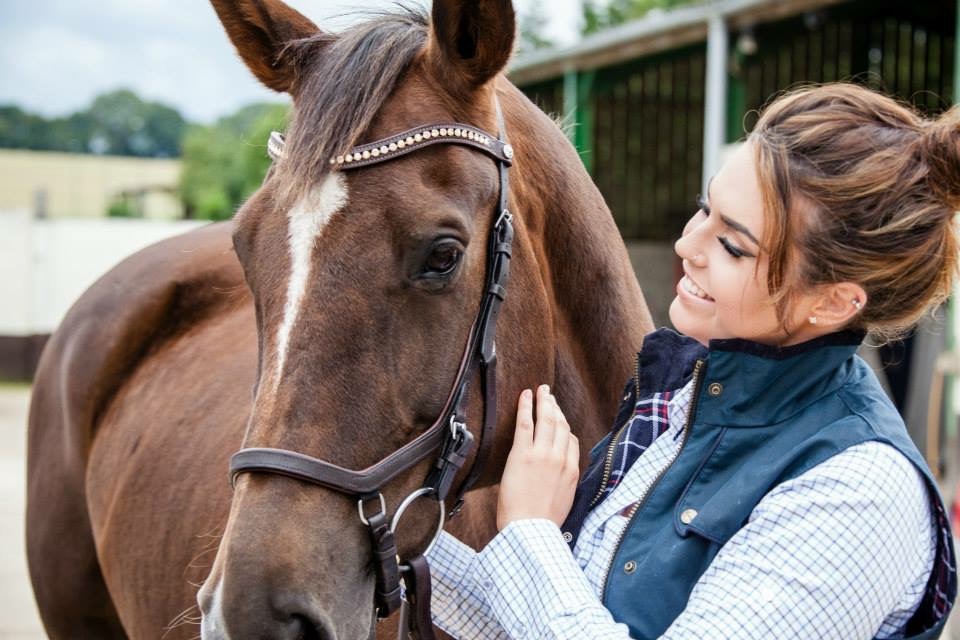 Olivia Curry (MRI)
Olivia Curry (MRI)
Project Title: Investigating the Risk Factors and Causal Agents of Equine Grass Sickness
Personal note: Hello, I'm Olivia and I have recently started my PhD studentship at The Moredun Research Institute, in partnership with the University of Edinburgh and the Equine Grass Sickness Fund. Working closely with Dr Kathy Geyer, this project aims to investigate both biological and environmental factors through identifying gaps in knowledge and undertake relevant research strands to elucidate causal agents and risk factors of this devastating and often fatal disease. Much of this data will be accessed through the EGSF Biobank.
Prior to starting my PhD, I completed a BSc in Animal Therapy and MSc in Animal Welfare Science, Ethics and Law, with both degrees furthering my passion for Equine Welfare.
Away from research, I spend a vast amount of time with my horses and enjoy hill walking in the beautiful Scottish countryside.
Paulina Czapnik (Dundee)
Project: Functions & Applications of a Novel Stem Cell Signalling Pathway
Research group page: Greg Findlay | MRC PPU
Dr Greg Findlay, MRC PPU, University of Dundee
Personal note: I began my scientific journey by successfully completing a Biomedical Science (Hons) degree in 2019 from De Montfort University, Leicester. Meanwhile, I have undertaken internship in the Sgamma lab, where I was involved in developing a DNA barcoding-based plant authentication kit for the MinIon sequencer and discovered my passion to research. This led me to a Masters by Research in Tissue regeneration in Rebecca Richardson’s lab at University of Bristol, during which I investigated cardiac specific gene expression in cardiac macrophages following zebrafish heart cryoinjury. I am now a BBSRC EASTBIO PhD student in Greg Findlay’s lab in the MRC Protein Phosphorylation and Ubiquitylation Unit at the University of Dundee. My current project aims to dissect novel functions of the SRPK signalling pathway in pluripotent stem cells and developmental disorders.
Gauri Deak (Edinburgh) Gauri is also your rep!
Project Title: Using Cryo-EM to investigate chromatin structure in Trypanosoma brucei
Personal Note: Hi, I’m Gauri. I am a PhD student in the MD Wilson Lab at the University of Edinburgh. My project aims to investigate chromatin structure in Trypanosoma brucei, a divergent eukaryotic parasite that is transmitted by the tsetse fly and causes sleeping sickness in humans and the disease nagana in cattle. I plan to combine biochemical, biophysical, and structural biology approaches to gain insights into the role of DNA compaction, epigenetic modifications, and chromatin-binding proteins in trypanosome gene regulation. This will hopefully improve our understanding of the pathology of sleeping sickness and aid drug development against trypanosomes and related parasites.
Prior to this PhD, I completed an Honours degree in Biochemistry at the University of Edinburgh and worked on neutrophil extracellular traps in the Peter Celec Lab at the Institute of Molecular Biomedicine in Bratislava.
In my free time, I like to hike, run, read, compose funky tunes on the piano, and plunge into chatterbox mode with my friends and family.
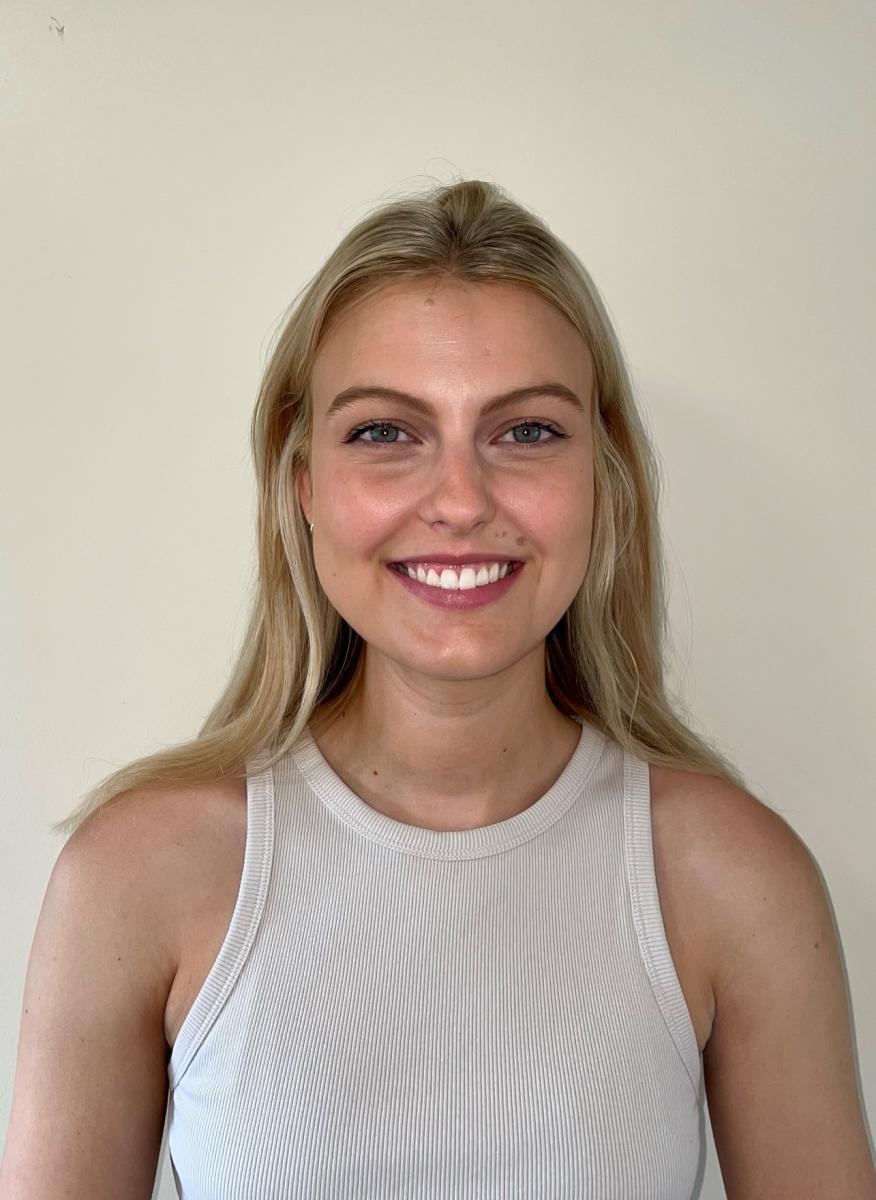 Rose Doyle (Edinburgh) Rose is also your student rep!
Rose Doyle (Edinburgh) Rose is also your student rep!
Project title: Development of novel three-dimensional co-culture models of host pathogen interactions.
Personal note: I have recently started my PhD at the University of Edinburgh, under the supervision of Dr Maddie Moule and Dr Jo Stevens. My project involves the development of three-dimensional co-culture models of bacterial host-pathogen interactions. I hope to be able to use these models, which resemble the pulmonary epithelium, to investigate the genes involved in the dissemination of Burkholderia pseudomallei, the causative agent of Melioidosis. This will contribute to our understanding of B. pseudomallei pathogenesis. Prior to this, I completed my BSc (Hons) in Biomedical Sciences at the University of Bath, where I discovered my interest in infectious diseases and host-pathogen interactions. I have never been to Edinburgh before, so I’m currently spending most of my free time exploring this incredible city!
Abdelazeem Elhabyan (Edinburgh) Abdelazeem is also your EDI rep!
Project title: The role of novel non-immunosuppressive cyclophilin inhibitors in inhibition of viral replication for SARS-CoV-2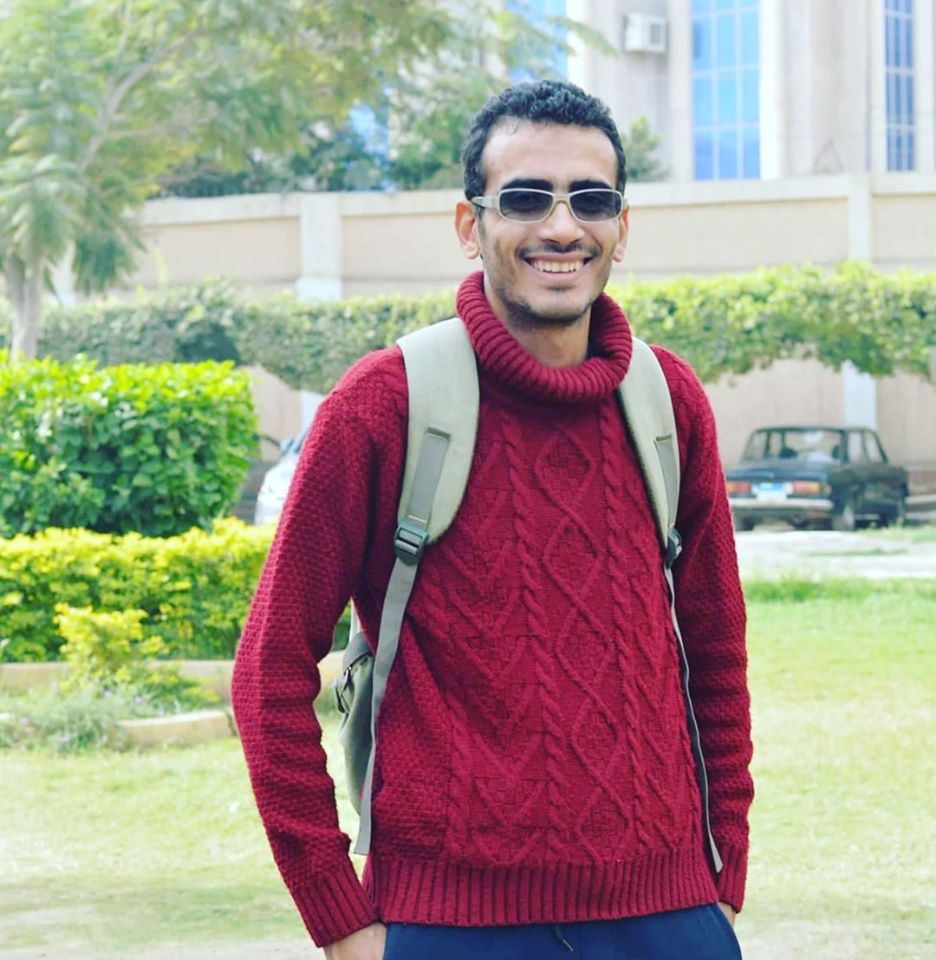 Personal note: Hi Everyone! I am Abdelazeem and I have just started my PhD in infection medicine at the University of Edinburgh. Our project is collaboration between academia and industry (pharmaceutical companies). I am doing molecular and virology studies on SARS-CoV-2 inhibition using novel compounds that interact with different cyclophilins (human proteins). We think that cyclophilins play a role in SARS-CoV-2 replication. At the same time, I will do protein-protein and protein-drug interactions with those novel drugs and different cyclophilins. We want to know the mechanism by which those drugs suppress viral replication and if this effect is specific to SARS-CoV-2 or if the drugs are inhibitors of all corona viruses. The second important thing is drug safety which we assess using cell culture at the beginning and after than animal studies.
Personal note: Hi Everyone! I am Abdelazeem and I have just started my PhD in infection medicine at the University of Edinburgh. Our project is collaboration between academia and industry (pharmaceutical companies). I am doing molecular and virology studies on SARS-CoV-2 inhibition using novel compounds that interact with different cyclophilins (human proteins). We think that cyclophilins play a role in SARS-CoV-2 replication. At the same time, I will do protein-protein and protein-drug interactions with those novel drugs and different cyclophilins. We want to know the mechanism by which those drugs suppress viral replication and if this effect is specific to SARS-CoV-2 or if the drugs are inhibitors of all corona viruses. The second important thing is drug safety which we assess using cell culture at the beginning and after than animal studies.
I completed my bachelor of medicine and surgery (MBBCh) at Tanta University in Egypt and ranked 15th on my class of more than 700 graduates and went on to complete my MSc in biomedical diagnostics at Arizona State University, USA with a GPA of 4.0/4.0. My ambition is to be a clinical scientist and transfer the knowledge that we generate at the bench to the bed side (translation research).
Originally, I am from Egypt. In my free time, I like to go on hikes, wander around the city of Edinburgh and visit historical places. Looking forward to seeing you all.
Prizes, Scholarships and Memberships:
2021 - Founder and lead educator of Clinical Research School for Arabs(107 lectures) with Egypt Scholars Link
2020
- Arab Youth Research Prize for the best 1000 young researchers in all disciplines Link
- Knowledge Mobilization award 2020 finalist at Arizona State University
- Genomics England invitation to curate gene panel for COVID-19 research Link
- Three scholarships by the University of Washington to attend 3 Bioinformatics workshops
- Graduate student prize by Arizona State University to attend ACED 2020 Early detection of Cancer Summer school
2019 - Full scholarship to study MSc (30,000 US Dollars) by Alghurair Foundation for Education - AGFE
2017 - Elected member of Genetics Society London
Regional trainer in the Arab and MENA region for Galaxyproject.org
International leaders in Genomic Medicine training by NHS England
2016 - Helped more than 80,000 student on socratic.org(Volunteering)
Contact: LinkedIn
Gabriela Mafra Fortuna (Edinburgh)
Project: Genetics and Breeding of taurine-indicine crossbred dairy cattle
Supervisors: Dr Andreas Kranis, Dr Gregor Gorjanc
Personal note: Hi, I’m Gabriela. I am based at the Roslin Institute, working with the Highlander Lab group. My PhD focuses on improving milk production in the Girolando dairy breed through genetics and breeding. Girolando is a crossbred between Holstein and Gir largely used in Brazil and can serve as a model to milk production in other tropical countries. I have a veterinary degree from Universidade Federal Fluminense in Brazil. Before starting this PhD, I got a double-MSc degree in Animal Breeding and Genetics at the University of Göttingen (Germany) and the Swedish University of Agricultural Sciences (Sweden).
Zishan (Sannie) Fu (Edinburgh)
Project title: 400 Million Years of Sugar Transport in Plants: unearthing the origin, evolution and genetic toolkit of the phloem
Supervisor’s staff research page
Personal note: Hi everyone! I am Sannie and I just started my PhD in Hetherington Lab - the Molecular Palaeobotany and Evolution Group. My research project is about the evolution and genetic toolkit of phloem with focuses on ferns and gymnosperms. It is an interdisciplinary study combining palaeobiology and comparative omics. Fossils and genomes are two sets of evidence that can reveal evolutionary processes in natural history. With the methodologies of both fields of study, we desire to gain insights into the evolution of phloem and provide fundamental knowledge for answering some unsolved questions in the field of evolution, such as what drove the early diversification and what gave rise to the vascular plants that dominate modern landscapes.
Previously, I completed a Bachelor’s degree in Horticulture at Zhejiang University and an MRes in Ecology, Evolution and Conservation at Imperial College. In my free time, I enjoy crafting, plant identification and taking part in environmental education and conservation activities.
Eleanor Hewett (SRUC)
Project Title: Exploring the role of nutrition in expression of positive and negative social behaviours to improve pig welfare
Supervisor’s research page: Simon Turner — SRUC, Scotland's Rural College
Personal note: After completing my BSc in Biology at Cardiff University, I took a job as a civil servant for part of the MoD. After two years of office work, I decided to go back to university to study for a MSc in animal behaviour and animal welfare at Queen’s University Belfast. That’s where I discovered my true love, improving farm animal welfare. After a brief period working for the RSPCA farm animals department, the siren call of research grew too loud to ignore so here I am!
In my spare time I try to keep active, I enjoy running, dancing and a nice long walk. I’m excited to see what Edinburgh has to offer and make the most of being back in a city.
Danielle Jordan (University of Aberdeen) 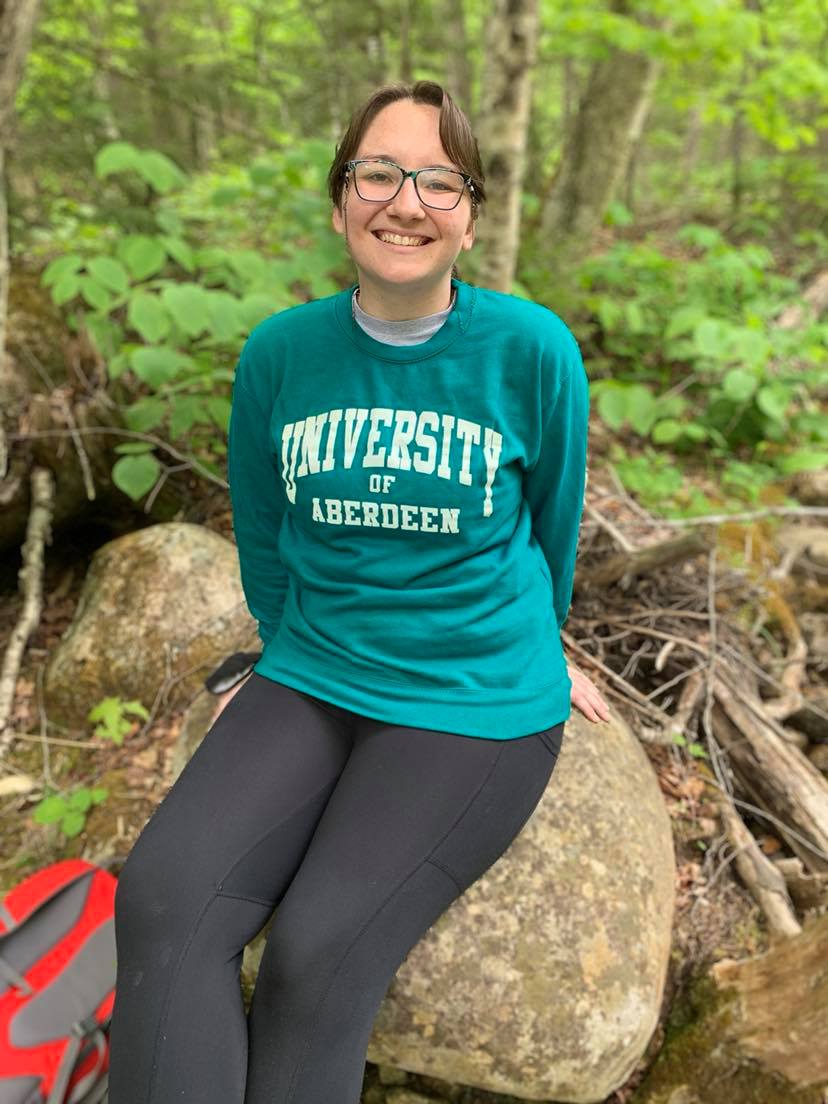 Project title: How do molluscs build their shells? Deciphering calcium transport mechanisms in shellfish biomineralization using genome-editing.
Project title: How do molluscs build their shells? Deciphering calcium transport mechanisms in shellfish biomineralization using genome-editing.
Personal note: Hello! I am from Rhode Island in the United States of America and received my BSc in Marine Biology at the University of Rhode Island. I spent three years working as a research assistant in the National Xenopus Resource at the Marine Biological Laboratory in Woods Hole, Massachusetts, where I utilized CRISPR-cas9 in Xenopus to study models for human disease and the evolution of sex determining mechanisms within the Xenopus genus.
My PhD research with Dr Victoria Sleight at the University of Aberdeen aims to develop CRISPR-cas9 mediated genome-editing protocols in a novel model, Crepidula, to decipher calcium transport mechanisms in biomineralization. Despite having over 80,000 extant species of molluscs, there has been no established model system to study their unique development. Crepidula have proven to be a robust species in laboratory studies since their original contributions to developmental biology in the late 1800’s, and thus are our proposed model for studying shellfish biomineralization. It is largely unknown how calcium is transported through the developing mollusc, and which genes are responsible for then constructing their shells. Moreover, they are an invasive species in the UK, so understanding their developmental processes is crucial for potential remediation.
Outside of research, I enjoy yoga, hiking, and reading as many books as I can get my hands on.
 Rumana Kapadia (Scotland’s Rural College/ University of Dundee)
Rumana Kapadia (Scotland’s Rural College/ University of Dundee)
Project title: “Exploring host-microbiota interactions for improved crop health and food safety” Supervisor: Dr Nicola Holden (Scotland’s Rural College)
Personal Note: Rumana graduated from the University of Dundee with her BSc in Biological Sciences and MSc by Research. She is now undergoing her PhD in Dr Nicola Holden’s lab at SRUC, continuing her work in using a synthetic community approach to define the genetic mechanisms underpinning plant-microbiota interactions. The project aims to determine the interaction of the plant microbiome with plant genotype and the resulting impact on plant immunity, for beneficial outcomes for improved crop health and food safety.
Outside of her studies, Rumana runs her own arts and crafts business, taking commissions from around the world. She enjoys exploring the outdoors, hill climbing, and finds inspiration in many aspects of nature.
Karen Keegan (Moredun Research Institute/University of Aberdeen) 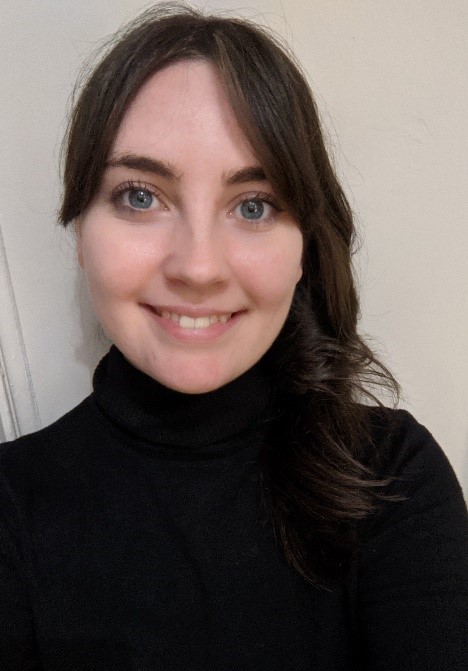 Project Title: Nanopore sequencing to investigate zoonosis and antibiotic resistance at the wildlife – livestock interface.
Project Title: Nanopore sequencing to investigate zoonosis and antibiotic resistance at the wildlife – livestock interface.
Supervisors:
Personal Note: Hi, my name is Karen and my PhD is based at the Moredun Research Institute, in collaboration with the University of Aberdeen. I completed my BSc in zoology at University College Cork (UCC) in Ireland, before moving to Cornwall to do a MSc in evolutionary and behavioural ecology at the University of Exeter’s Penryn campus. I worked for a few years as a research assistant/technician in various molecular ecology labs before taking the PhD plunge!
My PhD will focus on evaluating the use of nanopore sequencing (a third-generation sequencing technology) to help detect and monitor the transfer of foodborne zoonotic pathogens and antimicrobial resistance (AMR) between wildlife and livestock. The project will aim to evaluate nanopore sequencing as a tool to monitor 1) potential on-farm transmission of zoonotic pathogens and AMR between cattle and wild geese and 2) microbial contamination and AMR in the marine environment, through the sampling of grey seals which can act as a sentinel species for marine ecosystem health.
When I’m not in the lab I enjoy swimming, hiking and kayaking or, (more often) staying cosy inside while practicing a new recipe, with a podcast on in the background.
Rochelle Kennedy (SRUC)
Project title: Sustaining Biodiversity Through Mixed Farming Systems
Personal note: I am a PhD student at the SRUC in Aberdeen under the supervision of Dr Nick Littlewood, Dr Elisa Fuentes-Montemayor and Prof Kirsty Park. I am also a 1st year student rep.
I am committed to finding sustainable solutions for agriculture to improve biodiversity across farms, in order to help Scotland meet its biodiversity targets, build more resilient ecosystems, and improve yield by harnessing ecosystem services.
My project will investigate how different farming systems impact on biodiversity. I will be looking at how the reintroduction of livestock into crop systems might benefit biodiversity, compared with crop-only systems that have been on the increase over the past few decades. I will be measuring the effects of these systems on species that are good indicators of biodiversity such as plants and moths. I will also be measuring the effects of reintroducing livestock on bat feeding activity, as they provide an excellent pest control service and are a good indicator of insect abundance. This will help to explain some of the interactions taking place across the food chain.
Before starting my PhD I was working in an ecology consultancy for three years, where I carried out protected species surveys. This is where I discovered the fascinating world of bats!
Matin Mahmoudi (Edinburgh)
Project title: Role of FBXL20 in regulating immune response to viral infections
Rachel Martin (Edinburgh)
Project title: Understanding the role of antimicrobial peptides in intestinal T cell development
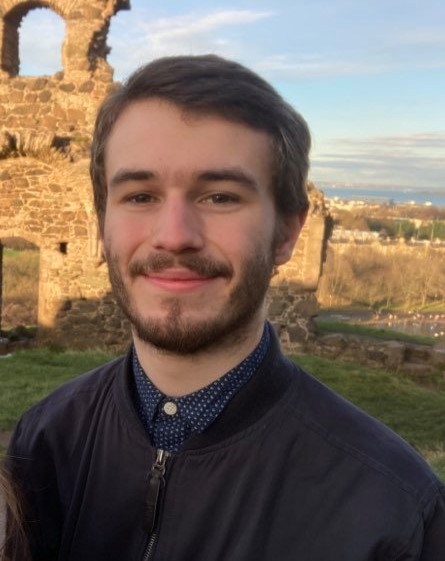 Robert Oskar Mason (Edinburgh)
Robert Oskar Mason (Edinburgh)
Project title: Dynamic ubiquitin signalling coordinates transcriptional reprogramming in plant immunity
Supervisor page: Steven Spoel
Personal note: Originally from York, I was awarded my undergraduate degree in plant science from The University of Edinburgh. After completing my BSc I took an MScR in the Spoel lab studying phloem mobile immune signals. I loved the project so much that I couldn’t bear to finish after one year and so I applied to continue this research as a PhD and here we are. My PhD project will assess the role of multiple phloem mobile signals and attempt to identify mechanisms by which they prime immune responses to display enhanced efficiency during secondary infections. This research has the exciting potential to delve into the analysis of proteomic, epigenetic and transcriptomic priming responses in plants.
Morag Milne (St Andrews)
Project title: Defining novel transport mechanisms for volume-regulating corticosteroids in the collecting duct of the kidney
Rafael Monteiro do Carmo (University of Dundee – James Hutton Institute)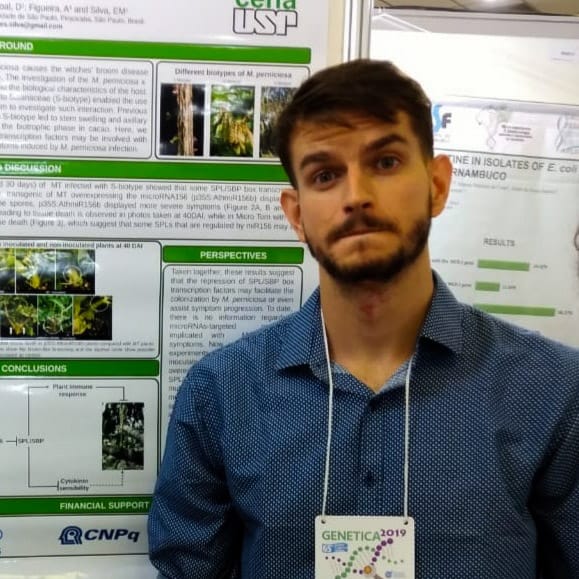 Principal Supervisor: Dr Edgar Huitema
Principal Supervisor: Dr Edgar Huitema
Project title: How does PcNMRAL1 orchestrate infection-associated gene expression changes during host colonisation?
Personal note: Hi, I am Rafael, and I have just started my PhD at the University of Dundee. Driven by my curiosity, Science and discovery have always been fascinating to me. Before my PhD, I did my BSc in Biotechnology at the Federal University of Sao Carlos, Brazil. I also did an MSc in Biology Applied to Agriculture and Environment at the Center of Nuclear Energy in Agriculture of the University of Sao Paulo, in Brazil, my home country.
For my master’s degree project, I’ve used tomato as a model to understand the role of microRNA156-targeted transcription factors in the pathogenesis of the fungi Moniliophthora perniciosa, which causes disease in Theobroma cacao (the chocolate tree). Now, on my PhD project, I will keep exploring the ever-evolving field of plant pathology. This time I will investigate the oomycete Phytophthora capsici, which affects several solanaceous plants. More specifically, I will further investigate possible interactions of the NMRAL1 protein of P. capsici with both DNA and proteins to modulate some biotrophic-associated genes and effector proteins.
My interests include pretty much every sport (especially football and basketball), games, anime, cooking, nature, camping, chess, and beer.
Alex Moxom (Edinburgh)
Project title: Generating novel sources of stem cells for regenerative and anti-infective applications
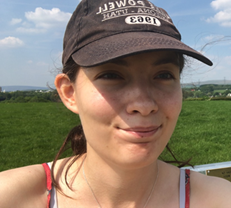 Amy Newell (Edinburgh) Amy is also your rep!
Amy Newell (Edinburgh) Amy is also your rep!
Project title: Light control of protein translation and plant biomass
Supervisor's page
Personal note: Hi, I’m Amy and I am a PhD student in the Halliday lab at the University of Edinburgh. My project is investigating how different lighting environments affect plant biomass and protein translation. I’m hoping this will generate some new insights into how plants respond to shade which ultimately could enable the use of denser cropping systems.
Prior to this I completed an MSci in Natural Sciences at Lancaster University where I studied modules across the biological sciences, chemistry and environmental science departments. During this time I undertook several projects to further my interest in plant sciences including my master’s thesis which explored the role of blue light and chloroplast RNA Binding proteins in post transcriptional processing in plants.
In my spare time I am a keen squash player and enjoy running and hiking. Outsider of my project, I’m very much looking forwards to exploring a bit more of Scotland.
Annis Newman (Edinburgh) Annis is also your rep!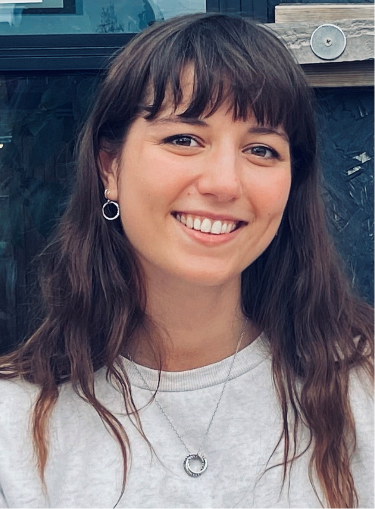 Project title: Unravelling bile resistance in zoonotic and invasive Salmonella serovars
Project title: Unravelling bile resistance in zoonotic and invasive Salmonella serovars
Personal note: Hello, I’m Annis and I am joining the laboratory of Dr Prerna Vohra at the University of Edinburgh, co-supervised by Professor Mark Stevens. In this PhD project we will examine Salmonella host-adaptation and specifically investigate how invasive Salmonella serovars interact with bile in the digestive system of livestock. Increasing understanding of the mechanisms that Salmonella serovars use to survive in bile will allow us to identify targets for application in vaccine development. Prior to starting my PhD, I graduated from the University of Bath in 2019 with a degree in Biomedical Sciences before working at Public Health England within the Food and Environmental Testing Proficiency Unit. Outside of the lab, I have been taking advantage of living in Edinburgh, spending my free time wild swimming, hiking and eating lots of vegetarian haggis!
Evangelia Notari (Edinburgh)
Project title: Computational design of multi-state proteins using molecular simulations and machine learning
Peter Palma (Stirling)
Project title: Genomic research to improve cleaner fish performance, welfare and efficiency at delousing salmon
Felicitas Pamatat (Aberdeen) Felicitas is also your rep!
Project title: Integrating social and ecological approaches for sustainable food production and biodiversity management: The case of Orkney farmers and Greylag Goose.
P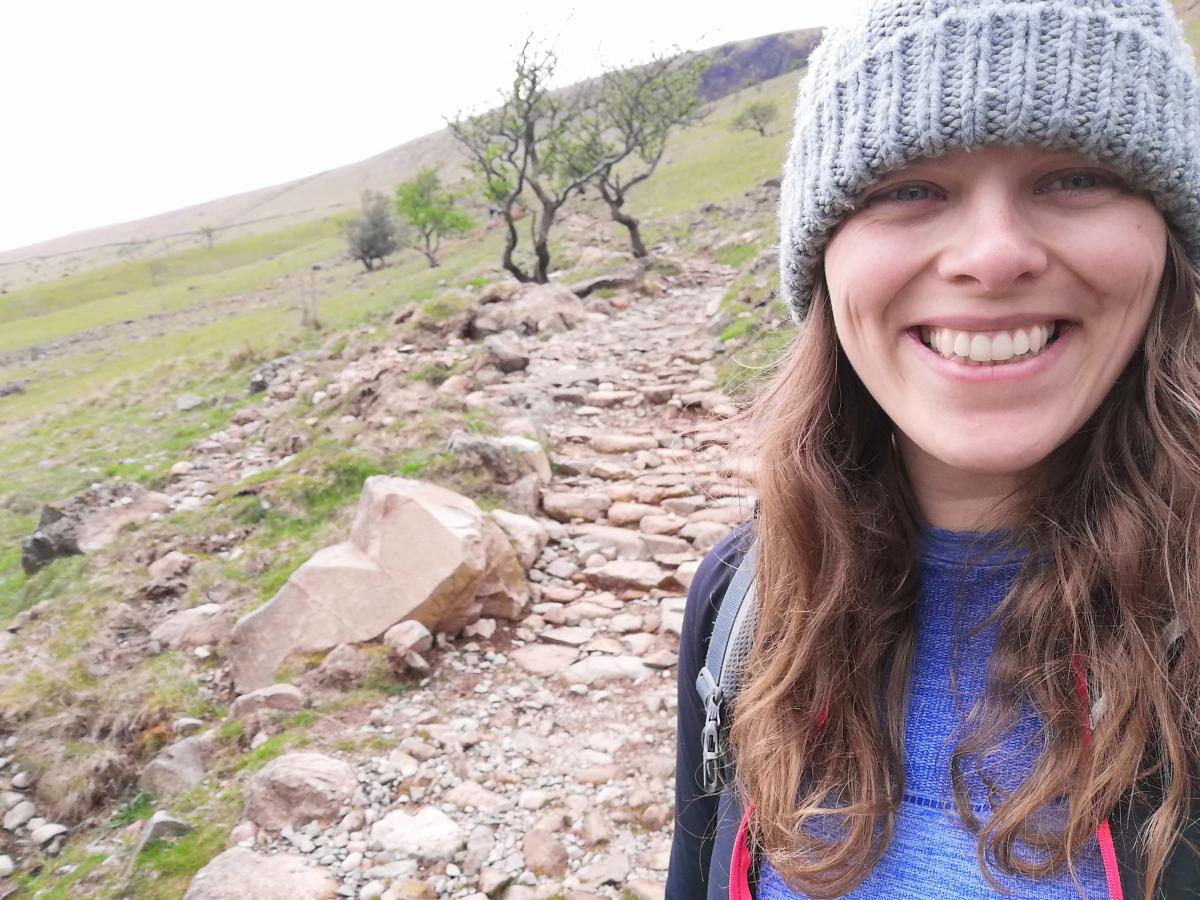 ersonal Note: Hi! I am Feli and your student representative for Aberdeen. In my PhD project, I will be looking at integrating social and ecological approaches to managing biodiversity and food production in Orkney sustainably. My research will focus on applying those approaches to the management of the Greylag Goose population in Orkney and highlighting the impacts of migrating bird species on their seasonal habitat.
ersonal Note: Hi! I am Feli and your student representative for Aberdeen. In my PhD project, I will be looking at integrating social and ecological approaches to managing biodiversity and food production in Orkney sustainably. My research will focus on applying those approaches to the management of the Greylag Goose population in Orkney and highlighting the impacts of migrating bird species on their seasonal habitat.
Before starting my PhD, I worked at UCL as an intern and research assistant, looking at the ecological impact of biscuits and being part of the 'Sentinel - Social and Environmental Trade-Offs in African Agriculture' project. I did my MPhil (Zoology) in Cambridge, 2019, and my BSc in Bielefeld, Germany, 2018.
In my free time, I enjoy hiking, climbing, rowing or playing a good board game. I am also really interested in science journalism and always keen to chat about ideas for outreach events.
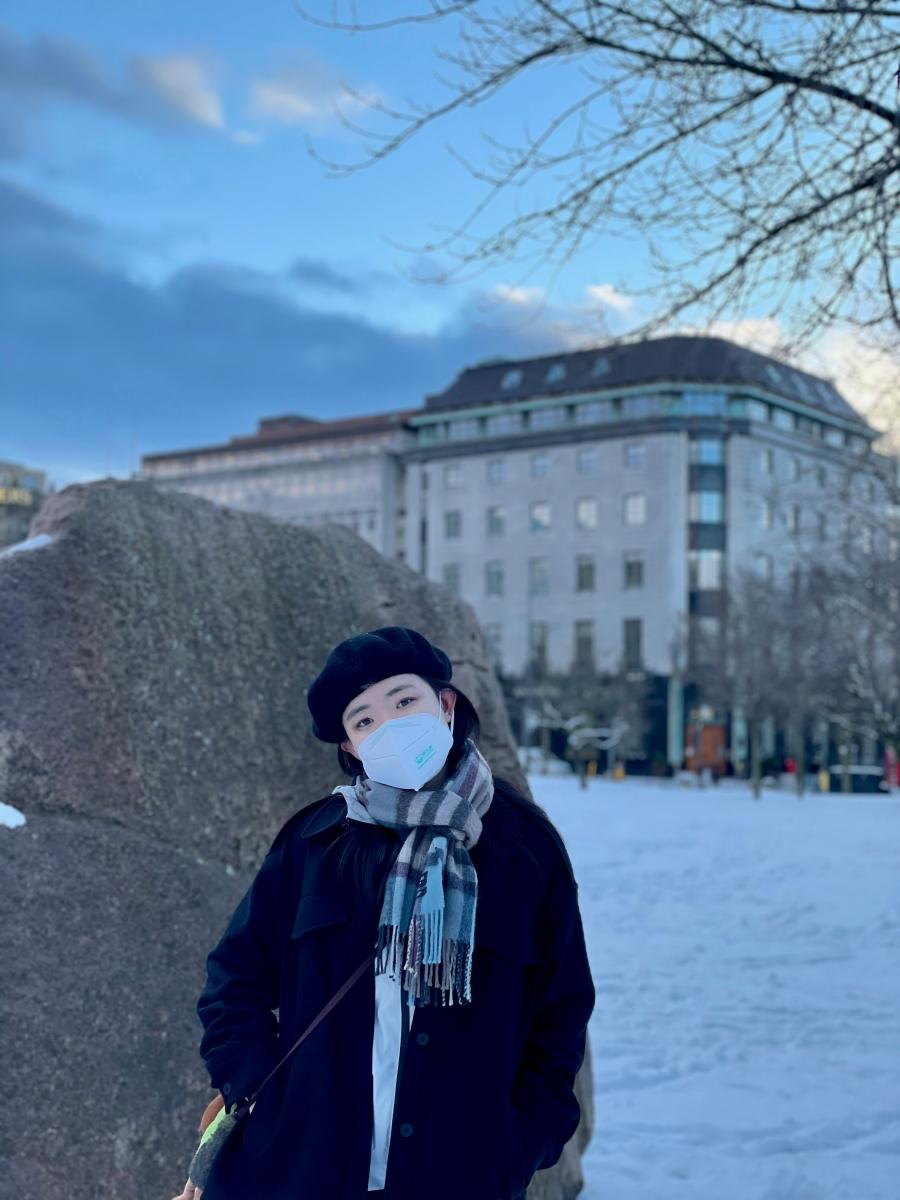 Guiyun QIU (Bella) (Edinburgh)
Guiyun QIU (Bella) (Edinburgh)
Project title: Mapping the blueprint of thymus development
Supervisor: Prof. Clare Blackburn
Personal note: Having pursued BSc and MSc by research at the University of Edinburgh in Biotechnology and Stem cell research respectively, I decided to continue academic research with the PhD project and I’m very excited to be working with Prof. Blackburn at CRM in Edinburgh. I’m particularly interested in stem cell research and T cell biology, and I’ll be exploring that area through tracing and mapping the development of thymus epithelial cells, which are specialised to support T cell development. Whilst my PhD project will be dissecting the development model of thymic epithelium, there is a hope to later refer that to remodel novel thymic organoids. Outside the lab I enjoy cycling and walking in Edinburgh city on sunny days :-)
Carys Redman-White (Edinburgh) Carys is also your rep!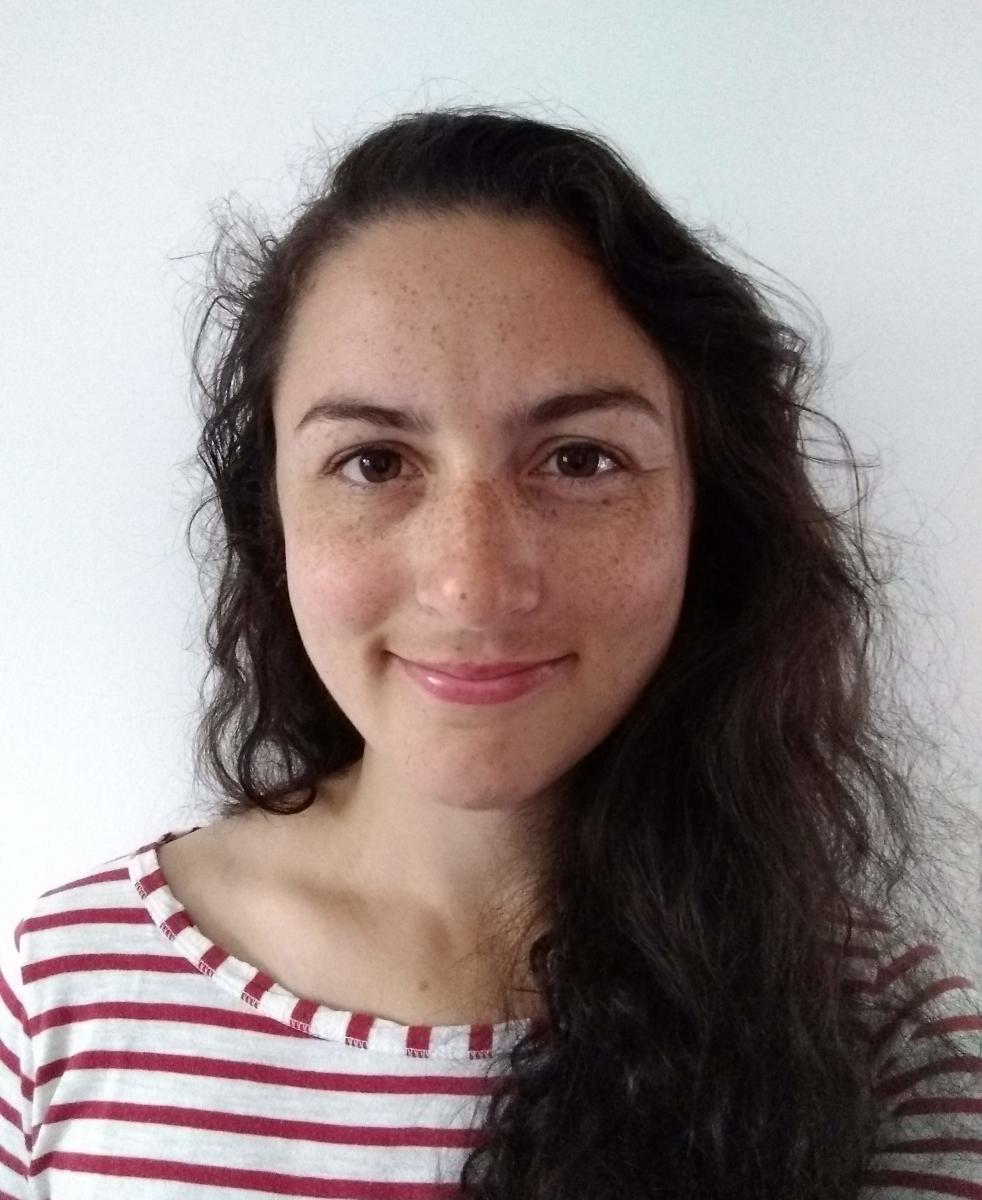 Project title: Antimicrobial use and resistance: Modelling the animal-human interface
Project title: Antimicrobial use and resistance: Modelling the animal-human interface
Personal note: Hi, I’m Carys and I’m researching antimicrobial resistance at Edinburgh University. I have a broad range of academic and non-academic interests and particularly enjoy the interdisciplinary nature of One Health research. I studied veterinary medicine at Cambridge University, intercalating in zoology with an emphasis on population dynamics and evolution. After finishing vet school, I spent three years working in clinical practice before returning to university in 2020 to carry out a human-oriented MRes in epidemiology at Newcastle University. During my MRes I focused on infectious diseases and global health and carried out analyses modelling the impacts of COVID-19 control measures on other communicable diseases. In autumn 2021 I began my EASTBIO PhD studentship at the Global Academy of Agriculture and Food Security (GAAFS) at Edinburgh University. I am approaching antimicrobial resistance epidemiology from a One Health perspective, supervised by Dominic Moran, Andy Peters and Adrian Muwonge. My cat, Eric, also likes to supervise when I work from home.
Shannon Richardson (St Andrews)
Project title: Understanding the structure and function of an important human metabolic enzyme
Kalvin Roberts (St Andrews)
Project title: The role of sequential effects in multisensory processing: A combined computational modelling and electrophysiology study
Nicola Rossi (SRUC)
Project title: Genetic characterisation and mathematical modelling of speed-breeding plasticity in barley
Alp Tegin Sahin (Dundee)
Project title: Computational and experimental electrophysiology of eukaryotic and viral ion channels
Rebecca Scaife (Edinburgh)
Project title: Determining the effect of Salmonella infection on long-lived intestinal macrophages and identifying their role in preventing inflammatory bowel disease and colon cancer
Personal note: I’m Rebecca and I’m joining Dr Tovah Shaw’s lab at the University of Edinburgh. I previously completed my integrated master’s degree in biomedical sciences at Newcastle University, which is where I discovered my interest in immunology and the gut. My project will focus of long lived intestinal macrophages and their interactions with the microbiota.
Monika Selvakumar (Edinburgh) Monika is also your rep!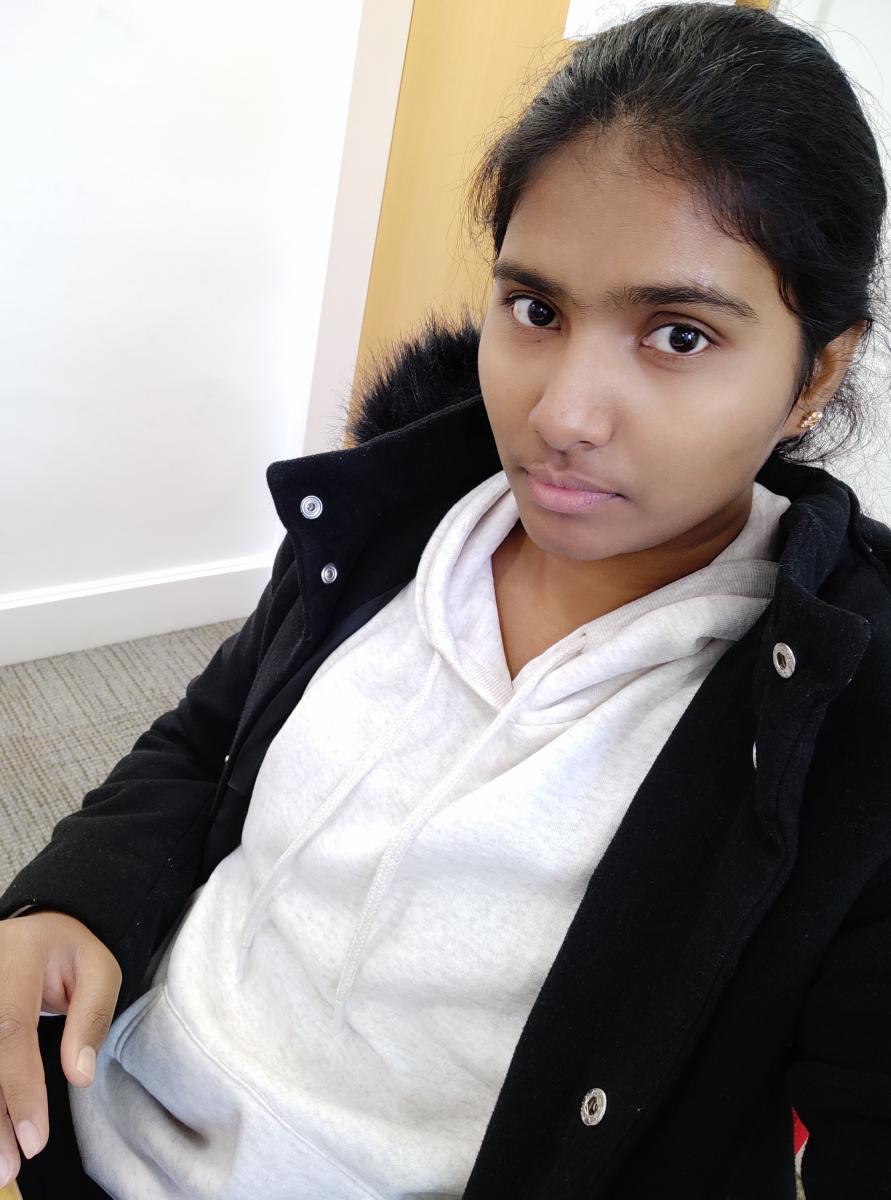 Project Title: Defining lipidomic biomarkers for the interactions between western diet and liver health using mass spectrometry imaging
Project Title: Defining lipidomic biomarkers for the interactions between western diet and liver health using mass spectrometry imaging
I am Monika, from India, and I am doing my PhD at the University of Edinburgh under the supervision of Professors Ruth Andrew, Jonathan Fallowfield and Scott Webster. My project aims to identify lipidomic biomarkers for non-alcoholic fatty liver disease (NAFLD) using mass spectrometry imaging. NAFLD is a spectrum of diseases that is mainly associated with obesity, insulin resistance, poor lifestyle habits, and metabolic dysfunction. Although the condition is preventable, it is being treated due to its asymptomatic nature, heterogeneity, and the lack of sensitive diagnostic tools and specific treatment makes it more complicated. My project aims to identify changes in lipids in the liver with response to different diets and compare and correlate it with various stages of NAFLD. This project involves a lipidomics approach to describe hepatic lipids and use mass spectrometry imaging (MSI) to analyze the animal and human liver samples. The lipidomic signature revealed by MSI will identify pathways to assess liver health and disease and identify markers amenable to therapeutic modification either by lifestyle or drugs.
Prior to this PhD, I did my master's degree in "Drug Discovery and Development" at University College London (UCL) and have an undergraduate degree in "Pharm.D. (Doctor of Pharmacy)" from Annamalai University, India.
Mubarak Shirooza (Dundee)
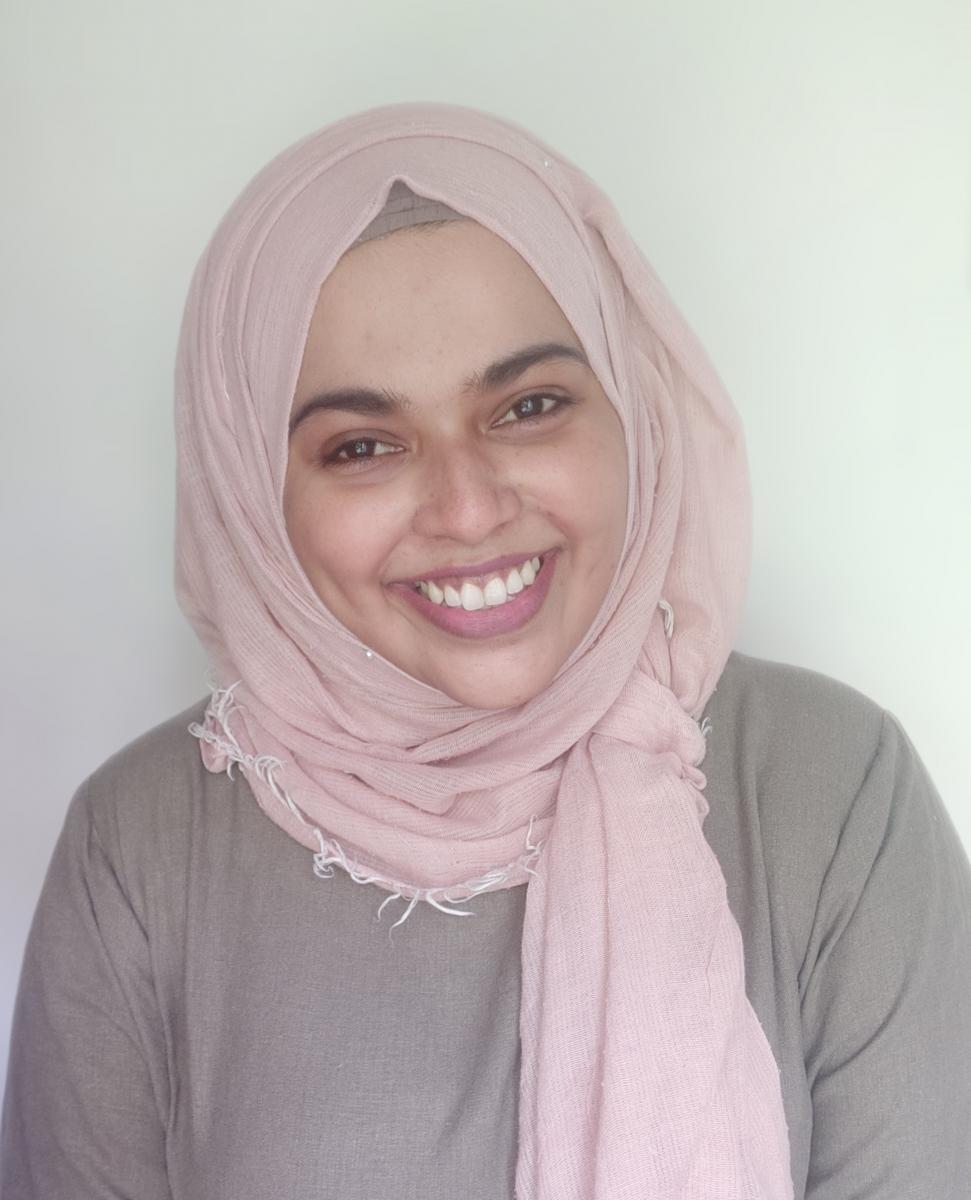 Project title: Development of lightsheet microscopy to study gastrulation in amniote embryo’s
Project title: Development of lightsheet microscopy to study gastrulation in amniote embryo’s
Supervisor’s staff research page:
https://www.lifesci.dundee.ac.uk/people/kees-weijer
https://www.dundee.ac.uk/people/michael-macdonald
Personal note: Hi, I’m Shirooza. I graduated with a BSc. (Hons) in Physics from the University of Peradeniya, Sri Lanka. My undergraduate research study was based on medical physics, for which I won the award for the best undergraduate research project for 2019, presented by the Institute of Physics, Sri Lanka. I’m starting my Ph.D. at the University of Dundee under the supervision of Prof. Kees Weijer and Dr. Michael MacDonald. Our research spans around the Life Science and Physics interface, where I will be studying about the early embryonic development of chick embryos. The aim of the project is to design and optimize a light-sheet microscope to further elucidate the fundamental principles that control the coordination of complex cell behaviors during embryogenesis. In my free time I like to read and bake.
Nadine Sommer (Aberdeen)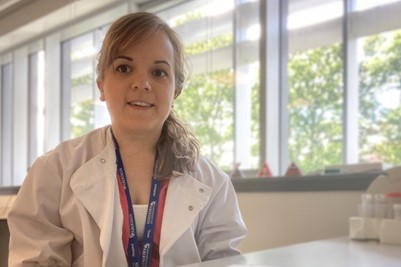 Project title: Coupling novel non-invasive imaging methods and new gene therapies to detect and treat type 2 diabetes
Project title: Coupling novel non-invasive imaging methods and new gene therapies to detect and treat type 2 diabetes
Personal note: Hi, I my name is Nadine, and I am from the sunniest and warmest area of Germany, a small village near Freiburg.
I was fortunate to complete an apprenticeship as a research technician at the Max Planck Institute of Immunobiology and Epigenetics in Freiburg, Germany. The time I spent there got me really interested in medical science, so I decided to study molecular and technical medicine at Furtwangen University, Germany. During my degree I did two Erasmus internships at the University of Dundee and this is where I got my soft spot for Scotland.
I started working at the Rowett Institute, Aberdeen, to study gene therapy that could help patients suffering from lipodystrophy, a rare condition were patients are unable to generate fat tissue. This leads to ectopic fat accumulation in other organs and causes impaired function, especially in the liver. Similar complications are known from people with obesity: Fat tissue reaches its expansion limit and lipids begin to accumulate in other tissues, leading to a fatty liver, type 2 diabetes but also cardiovascular disease and cancer. These diseases have increased dramatically in recent years around the world. In my PhD project I am continuing with this research and will explore a novel imaging method called fast field cycling imaging and a new gene therapies to treat type 2 diabetes.
In my free time I explore nature and wildlife with my camera. I am especially obsessed with birds and love to watch them. But I also enjoy a good book on a rainy day.
 Tim Spankie (Edinburgh)
Tim Spankie (Edinburgh)
Project title: Computational Biophysics of Synthetically Engineered Protein Nanopores
Personal note: Hello, I'm Tim, part of the Cockroft Group at the University of Edinburgh and the Zachariae Group at the University of Dundee. Building on previous experience, I use Molecular Dynamics, a computational tool to investigate protein nanopores, building up an atomistic view on molecules too small to view. The Cockroft Group has experimental expertise of the modification of these pores; however, working at the interface between experimental and computational design, my goal is to inform the design of transmembrane molecular machines that are capable of performing applicable work.
Anima Sutradhar (Edinburgh)Project title: Machine learning driven codon optimisation for heterologous protein expression.
Supervisor's research page
Personal note: Hi everyone! I am part of the Stracquadanio lab and my research is funded jointly by BBSRC/EASTBIO and Fujifilm Diosynth Biotechnologies. Since the dawn of humanity, scientists have been trying to find a way to optimise their codons. Hence, I am researching codon optimisation for heterologous protein expression using deep learning and natural language processing techniques (think Siri and Google Translate). Broadly speaking, I am trying to teach computers to understand the "language and grammar" of biological sequences, so that hopefully we can manufacture industrially relevant proteins in a more efficient way. Prior to this, I completed my BSc in Molecular Biology at UCL, worked as a policy officer on climate change at BEIS, and then completed my Bioinformatics MSc at QMUL. When I am not doing science, I love to star-gaze, hike, write songs, illustrate and discover very niche music genres.
Benjamin Thompson (St Andrews) Ben is also your student rep!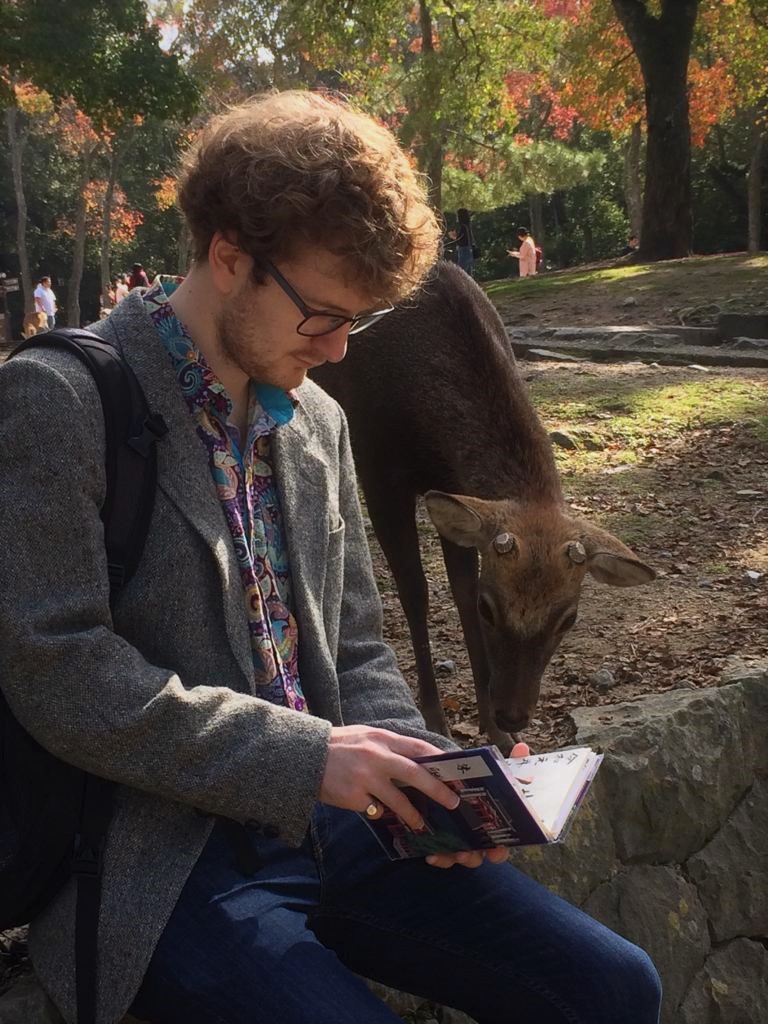 Project title: Spatial representations of depth: Do cognitive maps facilitate depth perception?
Project title: Spatial representations of depth: Do cognitive maps facilitate depth perception?
supervisor’s staff research page
Personal note: Hello! I will be studying my PhD in the Ainge lab at the University of St Andrews, looking at how our environment affects the way we navigate. Using in vivo animal electrophysiology and human psychophysics I will investigate the relationship between local and global environmental cues and the activity of spatially-oriented cells in the Medial Entorhinal Cortex of the rat, as well as how distorting environmental geometry can affect the accuracy of spatial cognition in both animals and humans. Insights into the mechanisms of spatial cognition may help us to better understand the neural processes underlying the distressing experiences of confusion, memory loss and wandering in dementias.
I received my Masters by Research in Neuroscience at the University of St Andrews in 2018, and my BMSc in Neuropharmacology and Behaviour at the University of Dundee in 2016. Between my studies I have spent my time working as a science and English language teacher in Japan, as well as volunteering with a Sustainable Development Virtual Field School run by National Geographic Explorers in Latin America and supervising a Mobile Testing Unit during the Covid-19 pandemic. My interests span from environmentalism and natural history to calligraphy and cinema, or whatever else happens to have caught my attention!
Luke Thorley (Edinburgh)
Project title: Discovering patterns in the genome of RNA viruses that drive evolution and regulate replication
Mary Tozer (Dundee)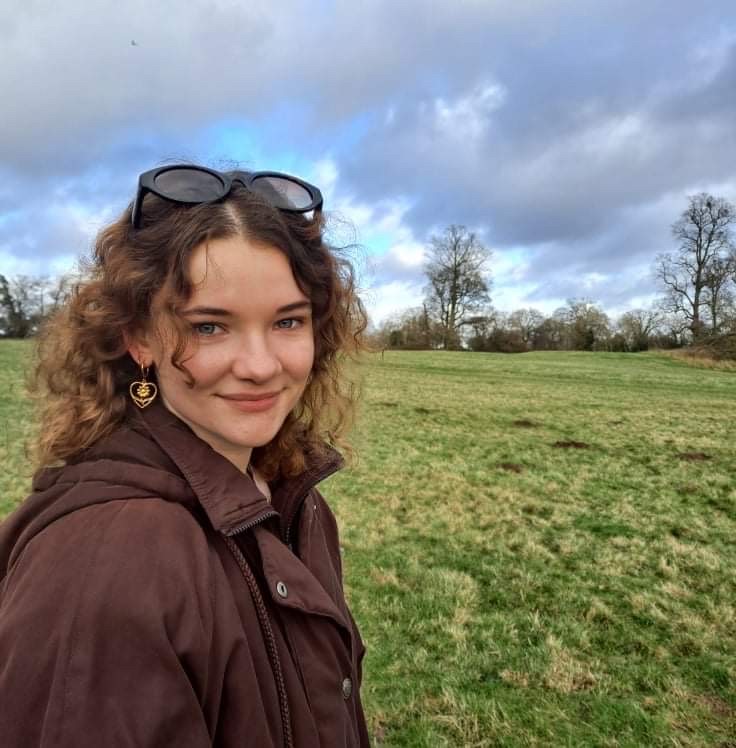 Personal note: Hiya! I’m Mary and I am 25 from West London. My project aims to dissect the signalling pathways that control the function of type 2 innate lymphoid cells (ILC2s), using a new technique proteomics technique (PRIMMUS) to facilitate analysis on the small, elusive ILC2 cell populations with Prof. Simon Arthur (Dundee) and Dr. Tony Ly (Edinburgh). This will allow us to see which functions help shape the Th2-mediated immune response, particularly looking at which changes are induced by cytokines IL-33 and IL-25. The type 2 immune response is relevant in a variety of maladies including asthma and allergies; inflammatory bowel disease; obesity; and helminth infection in both humans and livestock animals.
Personal note: Hiya! I’m Mary and I am 25 from West London. My project aims to dissect the signalling pathways that control the function of type 2 innate lymphoid cells (ILC2s), using a new technique proteomics technique (PRIMMUS) to facilitate analysis on the small, elusive ILC2 cell populations with Prof. Simon Arthur (Dundee) and Dr. Tony Ly (Edinburgh). This will allow us to see which functions help shape the Th2-mediated immune response, particularly looking at which changes are induced by cytokines IL-33 and IL-25. The type 2 immune response is relevant in a variety of maladies including asthma and allergies; inflammatory bowel disease; obesity; and helminth infection in both humans and livestock animals.
I graduated from Lancaster University with a BSc in 2017, followed by an MSc in Biomedicine in 2019, with a dissertation on immunology during co-morbidity with obesity and trichuriasis (helminth) infection. I then worked in water/waste treatment for Thames Water on a graduate scheme, followed by a year in the NHS (South West London Pathology) working in blood sciences. I hope to return to the NHS in a research role post-PhD.
In my spare time, I like crocheting, writing, listening endlessly to BBC 6 Music, vintage/retro clothes, and meandering around charity shops collecting interesting objects.
Sau Yee Tsoi (Edinburgh)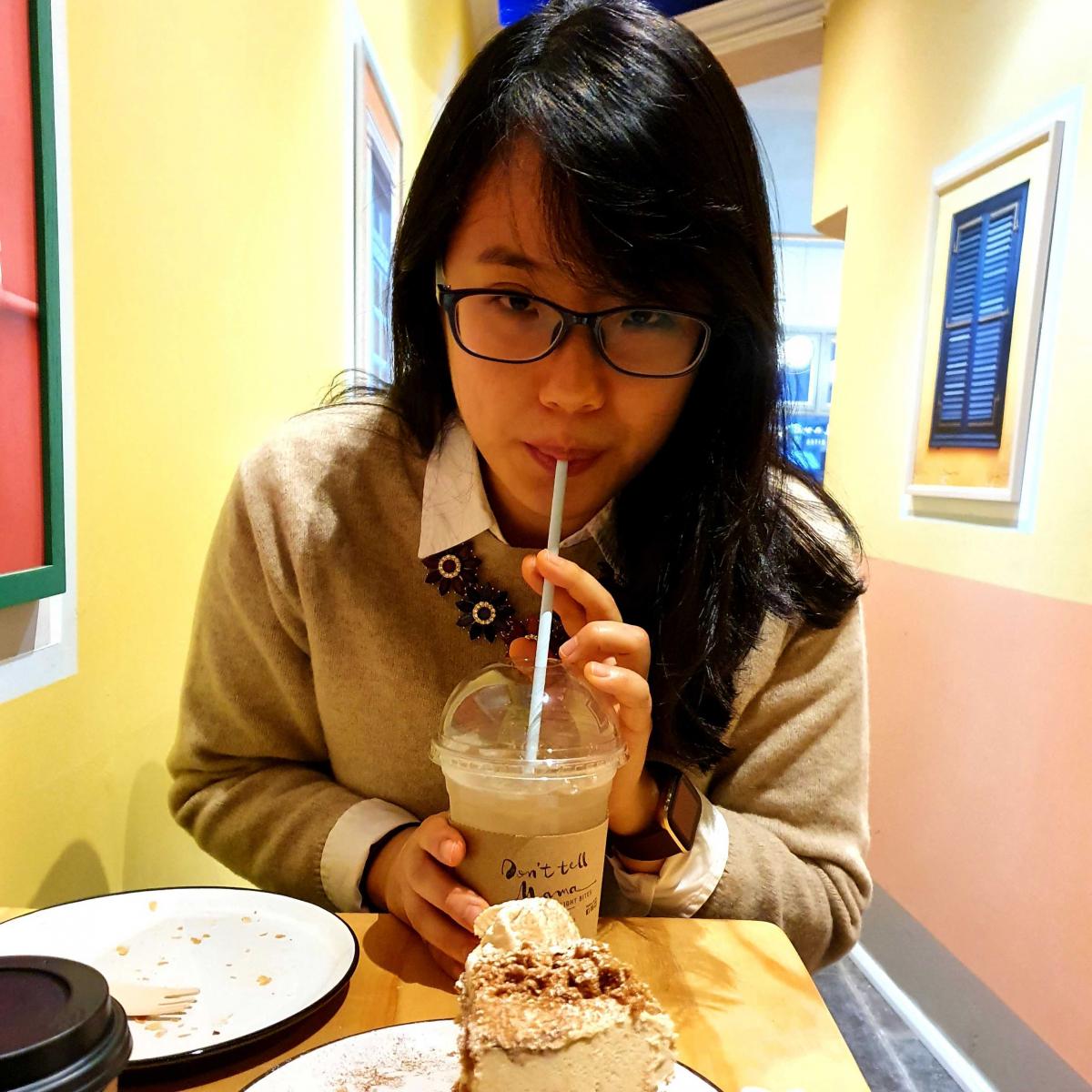 Project title: Investigation of brain-wide connectivity and cortical population codes for long-term memory
Project title: Investigation of brain-wide connectivity and cortical population codes for long-term memory
Supervisor: Dr Gulsen Surmeli (lab website: https://surmelilab.com/)
Personal note: Hi, my name is Sau and I’m from Singapore! I graduated from Yale-NUS College in 2017, majoring in Life Sciences, and came to the University of Edinburgh to do my Masters in Integrative Neuroscience. I loved the work and this city so much that I decided to stay on as a research assistant. After three years, I am finally starting my PhD in the Surmeli lab and I will be investigating how the entorhinal cortex plays a role in memory consolidation, a process by which episodic memories are transferred into long-term memory storage. In other words – how do we remember what we experience? Under the supervision of Dr Gulsen Surmeli and Dr Matthias Hennig, I will be employing a mix of molecular, histological and computational methods to closely examine the numerous and extensive connections that the entorhinal cortex forms with other cortical and sub-cortical areas of the brain. Outside of work I am also a Zumba instructor, and I enjoy baking and exploring Scotland.
Lucy Turnbull (Edinburgh)
Project title: Do duplicated genes drive morphological diversity
Personal note: Hi, I’m Lucy and I am part of Dr Kidner’s lab at the Institute of Molecular Plant Sciences. I am investigating the impact of gene duplication on begonia morphology, where an extreme diversity in leaf shape is found between species. I will be developing transformation techniques in multiple begonia species with the goal of utilising CRISPR technology to generate gene knockouts in duplicated leaf shape regulators. This will help us understand how duplicated genes can evolve new functions and how long superfluous duplicated genes can be retained. I am passionate about plant genetics, having graduated with an MBiol from the University or York in 2020 and having worked in a tropical plant biotechnology start-up company for over a year.
Outside of the lab I enjoy bouldering, playing the ukulele and looking after my mini forest of house plants.
Mert Unal (Edinburgh) Mert is also your rep!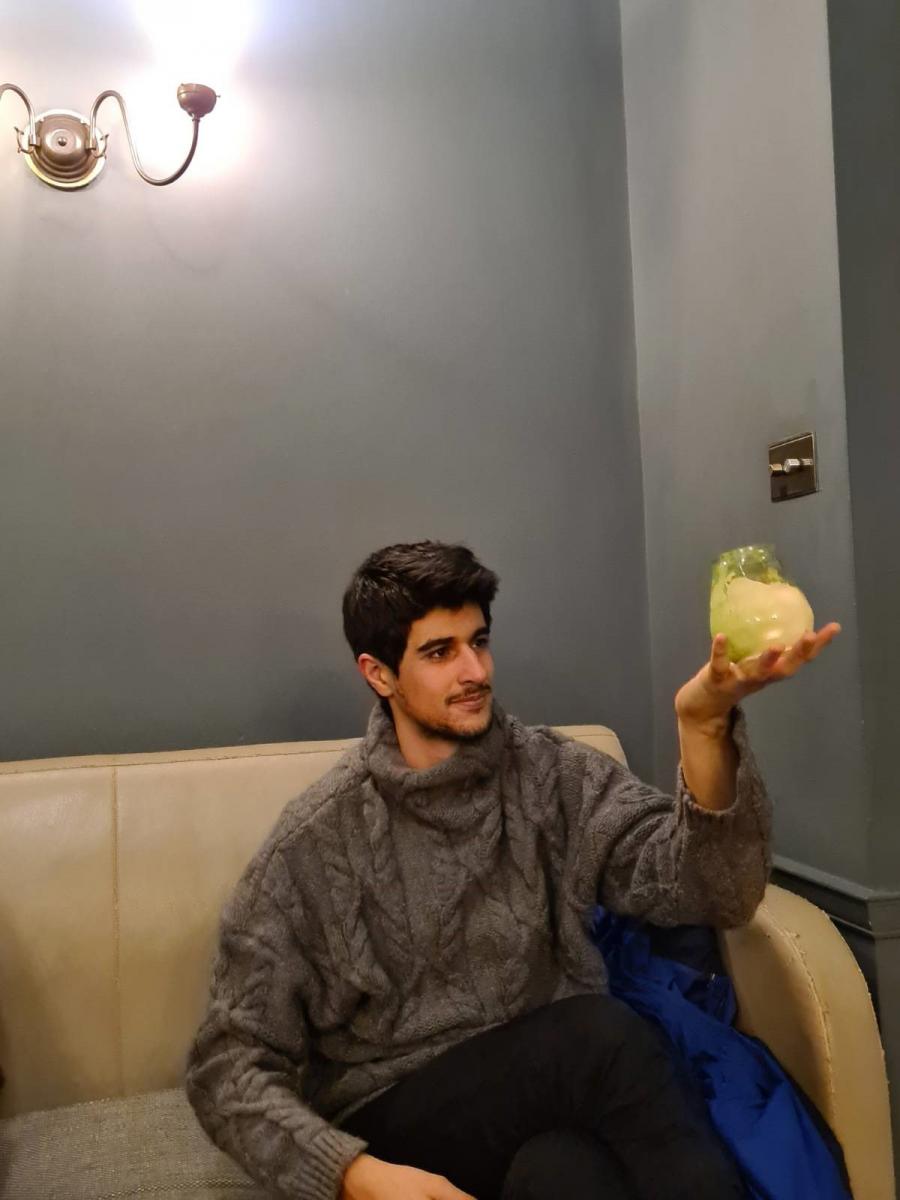 Project title: Computational design of novel proteins to bind unnatural cofactors
Project title: Computational design of novel proteins to bind unnatural cofactors
Personal note: Hi everyone! My name is Mert, and I will be conducting my PhD research under supervision of Dr Chris Wells Wood and Dr Stephen Wallace. The project will mainly focus on the replacement of heme cofactors bound to P450 cytochrome proteins with other cofactors that are not utilized by the nature. Such an achievement will help us in expanding the repertoire of chemical reactions that enzymes can perform, as well as increasing our ability to fine-tune their properties, and in the long run, contribute to the development of a biology-based economy. Before beginning my PhD project, I participated in research projects on evolutionary biology, immunology, protein biochemistry and biotechnology, and I am hoping to combine all of my knowledge in a single pot for this project.
If I have free time, I prefer spending it with going out on runs, playing basketball, learning how to press barre chord on guitar, or writing dystopian stories in a humorous manner (especially in a pub setting!).
Michaela Wegg (Edinburgh) Michaela is also your EDI rep!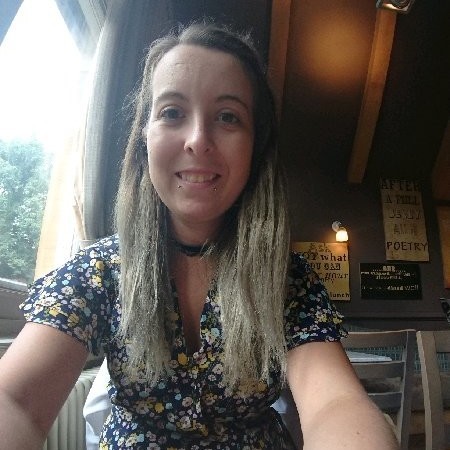 Project title: Ocular Tuberculosis: a one health multiparameter approach to diagnosis
Project title: Ocular Tuberculosis: a one health multiparameter approach to diagnosis
Personal note: My background is as a clinical veterinary ophthalmologist. I graduated from the University of Liverpool in 2015 with a BVSc and an MRes in Clinical Science (veterinary science). I have a postgraduate qualification in veterinary ophthalmology and have worked in veterinary ophthalmology since 2018. I have a small number of research publications in this area.
My PhD project will involve retinal imaging of cattle infected with bovine tuberculosis in order to assess the ocular phenotype for the disease in this species. I will also assess the immune cell composition of naïve and infected bovine eyes. There is currently no information regarding the immune cell composition within the bovine eye. Defining the immune and inflammatory changes that occur in the bovine eye during ocular tuberculosis (OTB) will enable detailed understanding of how OTB develops in cattle. Ultimately, this study will help to identify OTB in people and other species, improving its diagnosis, and lead to the development of therapeutic interventions for all species where treatment can be considered.
Charlotte Winspear (James Hutton Institute)
Project title: Effect of Nematode and Mycobacterium Avium Subspecies Paratuberculosis Infections on the Ovine Intestinal Microbiome
Wylan Wong (St Andrews) Wylan is also your rep!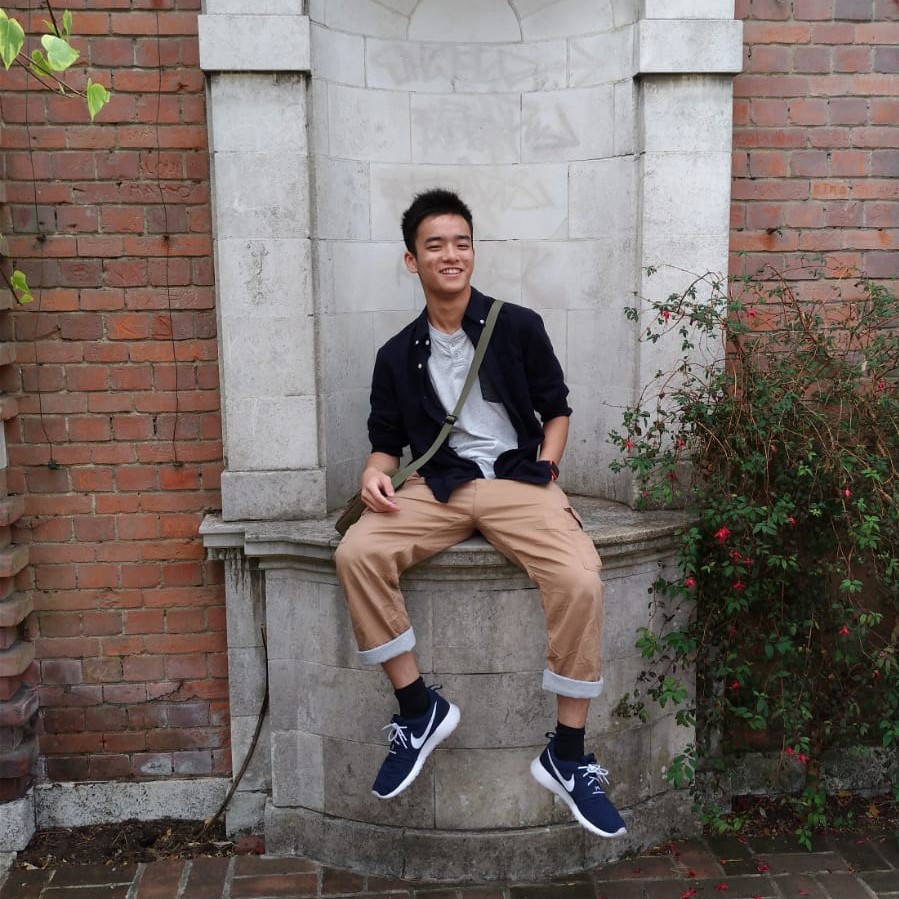 Project Title: Harnessing Bioluminescent Bacteria to Power Photochemical Transformations
Project Title: Harnessing Bioluminescent Bacteria to Power Photochemical Transformations
Lab website
Personal Note: Hi, I’m Wylan. I began my PhD studies at the University of St Andrews. This project is co-supervised by Dr Craig Johnston at St Andrews and Dr Stephen Wallace at the University of Edinburgh. We are currently working on an interface between synthetic chemistry and synthetic biology – both demonstrating exciting prospects in reducing the environmental impact of chemical manufacturing, but each with major limitations. We focus on the potential application of photocatalysis on the industrial scale while exploring the benefits brought by our favourite microbial workhorse – E. coli.
Prior to my PhD project, I took part in a year-long research placement under Dr Julius Brennecke on the Drosophila piRNA pathway at the Institute of Molecular Biotechnology of the Austrian Academy of Sciences (IMBA) in the Vienna Biocenter. I graduated in 2021 with a first-class BSc in Biotechnology and the Beloff-Chain prize at Imperial College London after completing my bachelor thesis under Dr Patrik Jones on the design and implementation of closed co-cultures of cyanobacteria (Synechocystis) and E. coli.
I’m originally from Hong Kong, but I’ve lived in Europe for some years now. In my free time, I’m an amateur theatre actor and writer, I love watching reptiles and insects do weird things, and I look forward to expanding upon my teaching experience as a PhD student.
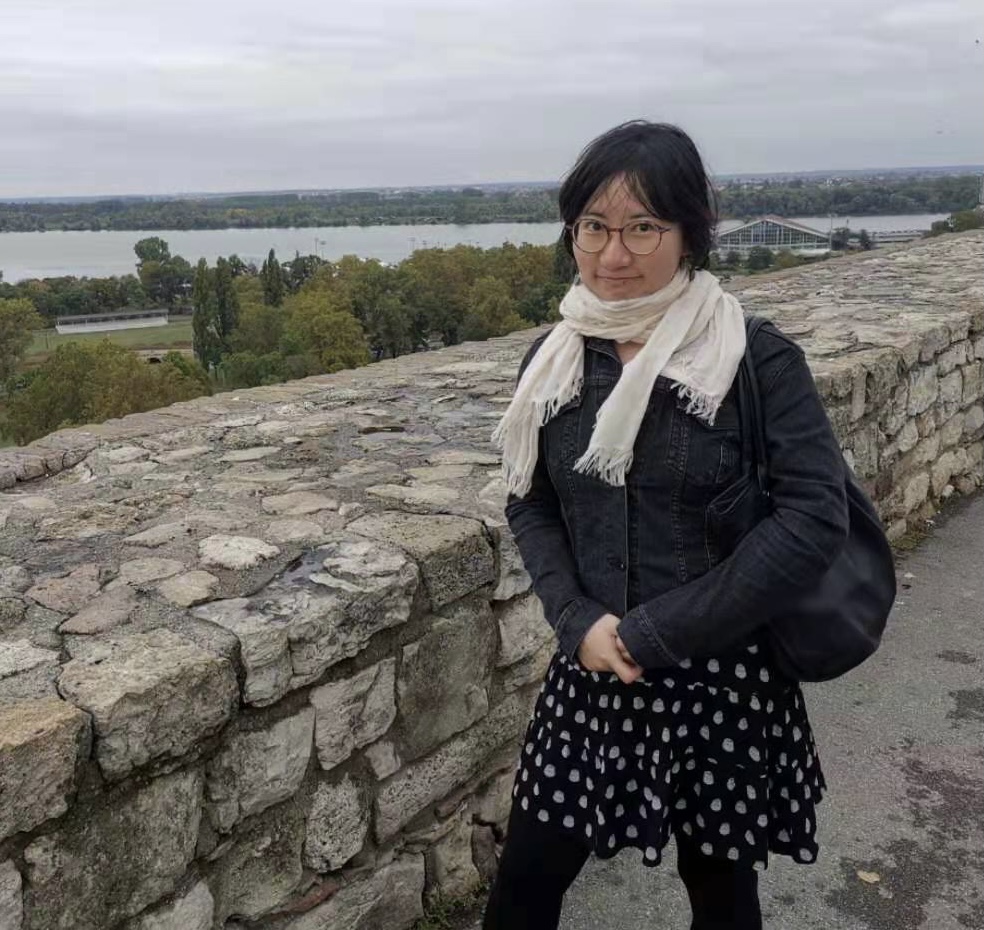 Yifang Yuan (University of Edinburgh - CMVM)
Yifang Yuan (University of Edinburgh - CMVM)
Project title: Ultra-high speed imaging of neuronal activity during behaviour
Personal note: I am interested in how memories are stored and consolidated in our brain, specifically, how neural oscillations in the hippocampus associated with learning and memory. My project is aimed at applying state-of-the-art tools to enable kilohertz frame rate imaging of neural activity. Combining this imager and genetically encoded voltage indicators will allow us to monitor the activity of specific cell types with a high temporal resolution in freely behaving animals. Once this imaging system is established, my project will be looking at the function of different cell types in generating and propagating neural oscillations such as theta rhythms and sharp-wave ripples.
This project is based in Professor Matthew Nolan’s lab at the Centre for Discovery Brain Sciences, University of Edinburgh, co supervised by Dr Istvan Gyongy and Dr Srinjoy Mitra from School of Engineering.











